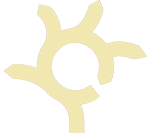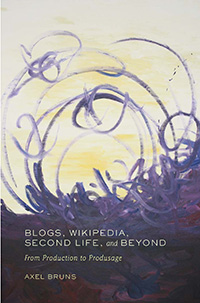You are here
Reading Sample 2 - Folks and Experts
Below is the second of four reading samples from Blogs, Wikipedia, Second Life, and Beyond: From Production to Produsage. These samples were first published as part of a series on the P2P Foundation Website, where the book was honoured as Book of the Week.
In this series:
- Produsage: An Introduction
- Folks and Experts
- Produsage and Technology
- Produsage and Democracy
2 - Folks and Experts
Wikipedia, and the environments of produsage more generally, can serve as vehicles for moves beyond established and increasingly ossified structures of knowledge and expertise; they pay respect not to abstract certificates of expert accreditation, but to the active display and embodiment of expertise through constructive participation in their communities of content and knowledge creation. At their best, therefore, they are by no means anti-elitist, but instead openly invite elites and experts to share their knowledge with the wider community so that the community overall is able to gain knowledge; they are opposed, however, to any tendency to take established expertise for granted and to use one's status as an accredited expert to refrain from answering legitimate questions and challenges, wherever they may originate. Thus, for example, in journalistic produsage the lack of special prestige accorded to experts "does not mean, however, that deliberative journalism should reduce all discussion to common sense. Rather, the perspectives of 'ordinary people' should be allowed to transform the analytical distinctions of established experts as well as define new questions." [1]
Such engagement between 'experts' and 'non-experts,' or indeed between the varying levels of expertise existing throughout the continuum, does not operate best through the facilitation of journalists, editors, or other intermediaries, but must be managed by the communities themselves; "in general, the most net-like solution … is going to be to bypass the notion of third parties and instead to find ways of putting the users' hands directly on the dial." [2] What emerges from this community-based model may well be what Van Doren described as "an entirely new organization of scholars" [3]: a community of knowledge creators and curators which involves those in the higher reaches of the continuum of expertise just as much as those further down the scale, and enables all to make contributions to the communal process as is appropriate to their skills and abilities - much in line with Bauwens's principle of equipotentiality which, as we have seen, assumes "that there is no prior formal filtering for participation, but rather that it is the immediate practice of cooperation which determines the expertise and level of participation." [4]
The other side of the equipotential coin, however, is also the realization by individuals that with the right to participate openly, that is, with the acceptance of a communal stance that all participants have a useful contribution to make, regardless of their level of accreditation as experts, comes also a responsibility: the responsibility to ensure that contributions are made only where individuals have a reasonable indication that their contribution will be constructive and useful to the common aim. In other words, "equipotentiality is the assumption that the individual can self-select his [sic] contributions, which are then communally validated." [5] This, then, is perhaps the full implication of the fundamental produsage principle of open participation and communal evaluation: an individual right, but also an obligation to the community, and a question of what we may describe as the individual's participatory capacity.
Such principles are clearly at work in many forms of collaborative content creation through produsage processes; in open source software development, for example,
the contributors for any given project are self-selected. … Contributions are received not from a random sample, but from people who are interested enough to use the software, learn about how it works, attempt to find solutions to problems they encounter, and actually produce an apparently reasonable fix. Anyone who passes all these filters is highly likely to have something useful to contribute. [6]
Indeed, such filters are necessarily more appropriate than any filters based on expert accreditation as "nobody but the individual concerned knows better the precise nature of the skills he [sic] can contribute" [7], but the precision of such self-selection processes also depends crucially on individuals choosing to assess their own skills and abilities honestly. This question of self-awareness of one's own abilities and limitations provides perhaps the greatest hurdle to constructive community participation in produsage, as many disruptive contributions are nonetheless made in good faith and from a sense of having something useful to contribute;
the prevalence of misperceptions that individual contributors have about their own ability and the cost of eliminating such errors will be part of the transaction costs associated with this form of organization. They parallel quality control problems faced by firms and markets. [8]
Here, of course, communal evaluation and filtering comes to play an important role both in policing participant contribution and neutralizing any potentially deleterious effects, and (through this process) in socializing participants to community values and needs in order to ensure that future contributions are more closely and directly aligned with the community's interests and goals. What is necessary, then, is a recognition and strengthening of community procedures by the communities themselves, and a sharing of knowledge about such processes throughout the entire project.
A stronger recognition and quantification of individual reputation and merit may help in this process; as Raymond notes for open source, "the … community's internal market in reputation exerts subtle pressure on people not to launch development efforts they're not competent to follow through on" [9], and the strengthening of similar 'markets' in reputation in Wikipedia and elsewhere is likely to provide further support for these other projects. Especially as such markets develop and are better recognized, then, it is also necessary to ensure that new community members are being made aware of the environment they are entering as they begin to participate; indeed, as Japanese Wikipedia administrator Kizu Naoko points out, already "on several wikis we have a 'welcoming committee', a group of users who inform newcomers of a principal set of policies and guidelines." [10] Ultimately, indeed, in keeping with the 'reputation market' metaphor Jenkins argues that what emerges from such community self-policing tendencies "might be called a moral economy of information: that is, a sense of mutual obligations and shared expectations about what constitutes good citizenship within a knowledge community." [11]
- Heikki Heikkilä and Risto Kunelius, "Access, Dialogue, Deliberation: Experimenting with Three Concepts of Journalism Criticism," International Media and Democracy Project, 17 July 2002, http://www.imdp.org/artman/publish/article_27.shtml (accessed 12 July 2007), n.p.
- Clay Shirky, "Clay Shirky Explains Internet Evolution," Slashdot, 13 Mar. 2001, http://slashdot.org/article.pl?sid=01/03/13/1420210 (accessed 20 Feb. 2002), n.p.
- Charles Van Doren, "The Idea of an Encyclopedia," American Behavioral Scientist 6.1 (1962), p. 26.
- Michel Bauwens, "Peer to Peer and Human Evolution," Integral Visioning, 15 June 2005, http://integralvisioning.org/article.php?story=p2ptheory1 (accessed 1 Mar. 2007), p. 1.
- Bauwens in Richard Poynder, "P2P: A Blueprint for the Future?" Open and Shut? 3 Sep. 2006, http://poynder.blogspot.com/2006/09/p2p-blueprint-for-future.html (accessed 1 Mar. 2007), pt. 1.
- Eric S. Raymond, "The Cathedral and the Bazaar," 2000, http://www.catb.org/~esr/writings/cathedral-bazaar/cathedral-bazaar/index.html (accessed 16 Mar. 2007), n.p.
- Bauwens in Poynder, pt. 1.
- Yochai Benkler, The Wealth of Networks: How Social Production Transforms Markets and Freedom (New Haven, Conn.: Yale University Press, 2006), p. 112.
- Raymond, n.p.
- Qtd. in Dirk Riehle, "How and Why Wikipedia Works: An Interview with Angela Beesley, Elisabeth Bauer, and Kizu Naoko," in Proceedings of the International Symposium on Wikis (WikiSym), 21-23 Aug. 2006, Odense, Denmark, http://www.riehle.org/computer-science/research/2006/wikisym-2006-interview.pdf (accessed 12 July 2007), p. 7.
- Henry Jenkins, Convergence Culture: Where Old and New Media Collide (New York: NYU Press, 2006), p. 255.
- Log in to post comments
- 15370 reads
 Printer-friendly version
Printer-friendly version


